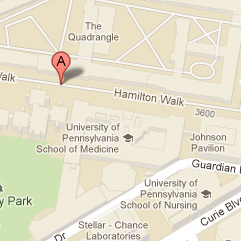Our Team

Dr. Osheiza Abdulmalik
Research Associate II
abdulmalik@email.chop.edu
Dr. Abdulmalik’s research interests broadly encompass the hemoglobinopathies and red blood cell disorders, with particular focus on sickle cell disease and beta-thalassemia. Though both disorders are consequences of simple genetic mutations, the implications of these mutations are inherently complex, and include significant morbidities, lifelong challenges, reduced quality of life, and early mortality in patients; as well as substantial healthcare burden on families, caregivers, and society in general. Dr. Abdulmalik’s current research focuses on three modalities of countering disease pathophysiology. The first approach, in tandem with a multidisciplinary team of collaborators, utilizes medicinal chemistry and structural biology to design novel drugs that block the primary pathophysiology of sickle cell disease, i.e., the polymerization of sickle hemoglobin. He employs an array of in vitro and in vivo assays to investigate the efficacy and pharmacokinetic/pharmacodynamic properties of select candidate drugs. The second approach investigates targeted mutations in the 3’ untranslated region of the beta globin gene to enhance the stability of the mRNA, with the ultimate goal of improving transgenes for gene therapy. The third approach investigates mutations in the coding region of the therapeutic beta-globin gene variants, which would, in addition to replacing the defective gene, confer additional beneficial effects, such as countering hemoglobin polymerization.
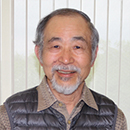
Dr. Kazuhiko Adachi
Research Assistant
adachi@email.chop.edu
Dr. Adachi studies protein-protein and protein-DNA interactions, which have an effect on biological functions such as sickle hemoglobin polymerization and a process of forming functional hemoglobin in vivo. He also investigates quality control of misfolded and unstable unbalanced globin chains in vivo that can lead to red blood cell destruction including the mechanisms of ubiquitin-mediated nascent and unstable unassociated globin chain degradation and role of chaperones. Dr. Adachi’s long-range goal is to define molecular strategies to cure sickle cell disease and thalassemia syndrome. He is currently designing hemoglobin variants and peptides for possible use in gene therapy for these diseases and is also working on blood substitutes. In addition, he is using a computerized screening strategy to identify inhibitors of the polymerization of sickle hemoglobin in an attempt to develop a therapeutic approach to sickle cell disease. He employs biochemical, biophysical and recombinant DNA technologies. In particular, his work involves various spectroscopy methods, x-ray analysis, kinetics of polymerization and assembly of recombinant hemoglobins, yeast and bacterial expression systems as well as cell-free systems and site-directed mutagenesis.
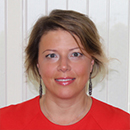
Dr. Laura Breda
Research Assistant Professor
bredal@email.chop.edu
Dr. Breda’s work is focused on developing genetic therapies for the cure of conditions such as Sickle Cell Disease (SCD) and β-Thalassemia, also known as hemoglobinopathies. At the moment, patients with SCD and β-Thalassemia undergo palliative care to overcome anemia and the multiple comorbidities acquired over time. The gene therapy approach, instead, represents a potential definitive cure for the patients, as it targets directly the underlining cause of the diseases. Dr. Breda developed several gene therapy tools to restore the production of hemoglobin, the oxygen carrier protein that is insufficient or dysfunctional in the red cells of patients with hemoglobinopathies. By using lentiviral vectors, complex vehicles she engineered to carry and permanently transfer β-like globin genes in hosts cells, she showed how patients’ cells treated can recover hemoglobin production, in both SCD and β-Thalassemia. She developed a platform to test in the laboratory how different red cells from patients, characterized by different mutations, can have different responses to the various constructs developed. This laboratory step is pivotal for developing safe and effective therapies for future clinical trials.
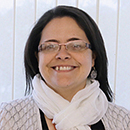
Dr. Carla Casu
Research Assistant II
casuc@email.chop.edu
Dr. Casu joined the Rivella lab while she was finishing her PhD in Italy in 2008. She is now focusing on developing new drugs for the treatment of disorders associated with abnormal iron metabolism and erythropoiesis. She characterized new drugs that mimic or increase hepcidin’s activity and reduce iron absorption and erythroid iron intake. These drugs are effective in improving the phenotype of mice affected by hemochromatosis, beta-thalassemia and polycythemia vera. As a result of her work, these compounds are now in clinical trials.
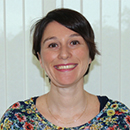
Dr. Roberta Chessa
Postdoctoral Fellow
chessar@email.chop.edu
Dr. Chessa started working in the lab in December 2013 as an Italian Graduate Visiting Student. She continued in the lab as a postdoctoral associate, focusing her attention on developing new approaches for the treatment of disorders associated with inflammation, abnormal erythropoiesis and altered Iron Metabolism. She received her Ph.D. in Developmental and Pediatric Pharmacology Therapy in Cagliari. During her Ph.D. she did an internship in the Laboratory of Human Genetics, Department of Human and Clinical Genetics, in Leiden University Medical Center where she focused on the molecular diagnostic of the HBB and DMD genes using the bench-top DNA Ion Torrent Sequencing and the Next Generation Sequencing Platforms. She received her Master of Science in “Experimental and Applied Biology Curriculum: Human Biology” and her Bachelor degree in “Experimental Biology, Curriculum Methods and Applied Biomolecular” from the University of Cagliari.

Alisa Dong
Graduate Student
donga@email.chop.edu
Alisa Dong received her B.S. in Bioengineering from Berkeley in 2009. After graduating, she worked at Genentech in Process Development and Early Stage Research; then with John Hogenesch on circadian rhythms at the University of Pennsylvania. In 2012, Alisa joined the Rivella lab at Weill Cornell Medical College for her PhD dissertation. She currently works on gene therapy and splice switching treatments for thalassemia and sickle cell anemia.
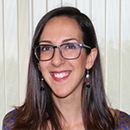
Valentina Ghiaccio
ghiacciov@email.chop.edu
Valentina Ghiaccio graduated in Experimental and Applied Biology at the University of Cagliari, Italy. During her degree, she spent a year at the Granada University, Spain, where she took active part in the project “Development of a lentiviral vector for gene therapy of immunodeficiencies.” Thanks to a Globus Fellowship, she subsequently spent a period of apprenticeship in the Gene Therapy Laboratory of the Austral Hospital in Buenos Aires, Argentina, taking part in the project "The Antitumor Effect of Combined Immunotherapy in Murine Colorectal Carcinoma.” Now she is a PhD. student in Molecular and Translational Medicine at the Cagliari University, working under the supervision of Professor Paolo Moi, pursuing a project that aims at the development of lentiviral based gobin vectors for the regulation of globin genes. She joined the Rivella Lab in October 2015 as an exchange student and working on RNA interference to improve the therapeutic potential of lentiviral vectors expressing therapeutic globin chains.
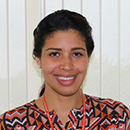
Dr. Amaliris Gonzalez
Postdoctoral Fellow
gonzaleza2@email.chop.edu
Shortly before graduating from Temple University with a Bachelors in Biology, Dr. Gonzales was recruited to the NSF funded Bridge to the Doctorate Program to obtain a PhD. Her thesis focused on a developmental time-course study on day-blind canines with mutations in the retinal cyclic-nucleotide-gated channel β-subunit. The work was part of a corrective gene therapy study for achromatopsia at the University of Pennsylvania's veterinary school. For her post-doctoral training, she has joined the gene therapy team in Dr. Stefano Rivella's laboratory, led by Dr. Laura Breda. Dr. Gonzalez is interested in developing strategies that target transferrin receptors, using lentivirus vectors, miRNA and CAR-T cell technology, to ameliorate symptoms of beta-thalassemia and sickle cell anemia.
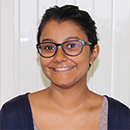
Ritama Gupta
Graduate Student
guptar3@email.chop.edu
Ritama Gupta obtained her Bachelor of Science in Microbiology from St. Xavier's College, University of Calcutta in India. She then proceeded to finish a year of Master of Science in Microbiology at the same institution before joining the PhD program in Immunology and Microbial pathogenesis at Weill Cornell Medical College. She joined the Rivella lab as a graduate student in 2012 and is currently a fifth year graduate student working on two different projects. One is the transcriptome analysis of macrophages in stress erythropoiesis, and the other is investigating the role of IL-6 and Hepcidin in anemia of inflammation.
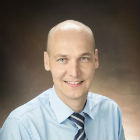
Dr. Helge Hartung
Assistant Professor
hartungh1@email.chop.edu
Dr. Hartung’s clinical efforts focus on pediatric non-malignant blood disorders, with a specific emphasis on the diagnosis and management of children with inherited and acquired bone marrow failure syndromes. As a member of the Division of Hematology and the Bone Marrow Failure Center, his goal is to ensure state-of-the-art diagnostics for patients with suspected bone marrow failure syndromes and to assist in the development of optimal treatment plans.
He was one of four scholars chosen for the newly created Entrepreneurial Science Track within the University of Pennsylvania’s Masters for Translational Research program offered by Institute for Translational Medicine and Therapeutics (ITMAT). In this capacity, Dr. Hartung has developed expertise in medical device development and its regulatory infrastructure. Dr. Hartung has built industry collaborations for CHOP and is currently working on the development of an automated device for bone marrow aspirates and biopsies.
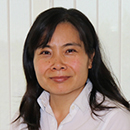
Dr. Ping La
Research Scientist I
lap@email.chop.edu
Dr. La received her Ph.D. on Molecular Genetics from the Chinese Academy of Sciences and joined the lab in 2016. Dr. La is focuses on the research of iron metabolism and mitochondria biogenesis, especially in normal and abnormal erythropoiesis. Currently, she is working on identifying new pathways and molecules that control erythropoiesis, in normal and disease conditions, focusing on beta-thalassemia and MDS.
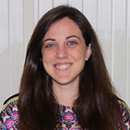
Vania Lo Presti
Visiting Undergraduate Student
loprestiv@email.chop.edu
Vania Lo Presti is a Medical Biotechnology student in "Università Vita-Salute San Raffaele", Milan (Italy). She joined the lab in October 2015 for her thesis internship. Her project focuses on understanding the role of TNF-α during Anemia of Inflammation, the second most common cause of anemia. Her goal is to obtain a new insight to better understand diseases such as inflammatory bowel diseases (IBD) and rheumatoid arthritis (RA).
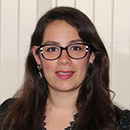
Silvia Pires Lourenco
Visiting Graduate Student
pireslours@email.chop.edu
Silvia Pires Lourenço received her Bachelor in Molecular Cell Biology from Faculty of Science and Technology, New University of Lisbon, in Portugal. She then proceeded to finish a 2 years Master in Molecular Biology and Genetics from the Faculty of Sciences, University of Lisbon, Portugal. In 2013 she joined the Graduate Program in the areas of Basic and Applied Biology at University of Porto, Portugal. She joined the Rivella lab as a graduate student in 2014. She is currently a third year graduate student working on developing two pronged approaches using lentiviral vector for the cure of beta-globinopathies.
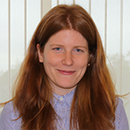
Emir O'Hara
Lab Manager
oharae1@email.chop.edu
Emir O’Hara completed her Bachelors of Arts at the College of Wooster in Wooster, Ohio where she was first exposed to research studying the developing stress response of young bluebird chicks. After college she worked in various neuroscience related settings before joining the Rivella group in 2014 as a research technician to Dr. Laura Breda. Emir works now between the Gene therapy group under Dr. Breda and with Dr. Casu where she will help develop a protocol for in-utero gene therapy for mouse models of sickle cell disease and beta-thalassemia.
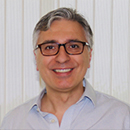
Dr. Stefano Rivella
Kwame Ohene-Frempong Chair on Sickle Cell Anemia and Professor of Pediatrics
Rivellas@email.chop.edu
Dr. Stefano Rivella completed his studies at the University of Pavia, in Italy, and did his postdoctoral work at Memorial Sloan Kettering Cancer Center, in New York City. After his training, he opened his laboratory at Weill Cornell Medical College in New York City, where he was Director of the Stanley Jaffe Gene Therapy Lab. He is now a Professor of Pediatrics with tenure at the Children’s Hospital of Philadelphia and University of Pennsylvania and holds the Kwame Ohene-Frempong Chair on Sickle Cell Anemia.
Dr. Rivella is an expert in the pathophysiology of erythroid and iron disorders and in the generation of lentiviral vectors for the cure of hemoglobinopathies. Even though hemoglobinopathies such as beta-thalassemia and sickle cell anemia affect a very large number of children worldwide, these disorders are generally neglected. When possible, patients receive chronic blood transfusion and iron chelation for survival. The only definitive cure has been bone marrow transplant, but this approach is limited by finding a compatible bone marrow donor and potential complications associated with the transplant.
Dr. Rivella generated the first adult mouse model of ß-thalassemia major and contributed to the creation of the first lentiviral vector that corrected the hemoglobin synthesis in mice affected by beta-thalassemia. This led the way to the present gene therapy clinical trials. He is also generating new lentiviral vectors for the treatment of ß-thalassemia and sickle cell anemia. He showed correction of the hemoglobin synthesis defect in mice as well as in patient cells in vitro, as a preclinical test for potential gene therapy trials.
Dr. Rivella works on additional disorders such as anemia of inflammation, which is a form of anemia associated with many inflammatory disorders, and hemochromatosis, which is associated with abnormal iron absorption from the diet. Anemia of inflammation is a type of anemia that commonly occurs with chronic, or long term, illnesses or infections. Cancer and inflammatory disorders, in which abnormal activation of the immune system occurs, can also cause anemia of inflammation. Patients affected by hemochromatosis show an excessive amount of iron in their organs, leading to complications such as heart failure and cirrhosis.
Dr. Rivella also studies polycythemia vera, which is associated with an excessive production of red cells, and anemia of inflammation, which shows aberrant production of inflammatory cytokines, disturbed iron metabolism and reduced production of red cells.
Dr. Rivella characterized the role of seminal factors contributing to the morbidity and mortality in these disorders, such as hepcidin and ferroportin, which are the molecules that control iron absorption and organ iron distribution; the phosphokinase JAK2, which is one of the key molecules responsible for controlling red cell production; and macrophages, which play an important role in iron recycling, inflammation as well as erythroid proliferation and maturation. Dr. Rivella also investigated a number of the physiological mechanisms associated with the inappropriate amount of iron observed in the organs of patients with beta-thalassemia, and reduced red cell production in anemia of inflammation. Based on these studies, he contributed to the development of novel therapeutics, presently in clinical and preclinical trials.
Dr. Rivella was awarded Italy's Best University Thesis by the Italian Genetics Institute (AGI), the First Prize of the New Investigator Award (T. Ray Bradley Award) at the International Society of Experimental Hematology, the International Thalassemia Award in Innovative Medical Research sponsored by the Sultan bin Khalifa, and travel and fellowship awards from numerous international scientific societies.
He has received grants from the Cooley’s Anemia Foundation, European Community, Roche Foundation for Anemia Research (RoFAR)-Roche, Medgenics, Merganser Biotech, Ionis Pharmaceuticals, Bayer Healthcare and the National Institutes of Health (NIH) as a PI or Investigator. He also received the Daedalus Fund for his project “A universal approach for the cure of hemoglobinopathies”. The Daedalus Fund for Innovation is a program designed to advance early stage applied and translational research projects that have commercial potential.
Dr. Rivella has been providing expertise on mouse models important for red blood cell and macrophage biology as well as inflammation and iron metabolism to many US laboratories and pharmaceuticals interested in learning these subjects and/or testing new drugs. As such he has collaborated or provided consultation to many companies, biotechs and pharmaceuticals, such as Rana Therapeutics, Keryx Pharmaceuticals, Nektar Therapeutics, Novartis Pharmaceutical, Ionis Pharmaceutical, Merganser Biotech, Bayer Pharmaceutical, Megenics LLC, Biomarin Pharmaceutical, and Alexion Pharmaceutical. He is presently a member of the Scientific Advisory Board (SAB) of Merganser Biotech and Ionis Pharmaceutical.
Dr. Rivella has been a member of the Scientific Committee on Red Cell Biology and Chairman of the Scientific Committee on Iron and Heme of the American Society of Hematology (ASH) and Director of the International BioIron Society (IBIS). He is or has been a member of the American Society of Hematology (ASH), BioIron Society (IBIS), Società Italiana Talassemie ed Emoglobinopatie (SITE), European Medicines Agency (EMA), American Society of Gene & Cell Therapy (ASGCT), International Society of Experimental Hematology (ISEH), the New York Academy of Sciences (NYAS), American Society of Gene and Cell Therapy (ASGCT) and International Society for Stem Cell Research (ISSCR) and reviewer on several National Institutes of Health (NIH) study sessions.
He is one of the lead authors of the paper “The European Hematology Association Roadmap For European Hematology Research: A Consensus Document”. In the last decade, he has been teaching the subjects of normal and aberrant erythropoiesis, iron metabolism and gene therapy to PhD, MD and MD/PhD students (in US and foreign countries), explaining the use of transgenic animals, gene transfer vectors, the pathophysiology of many human diseases and the emerging of new therapies.
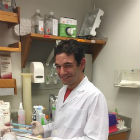
Adrian Sanchez
Visiting Scholar
sancheza2@email.chop.edu
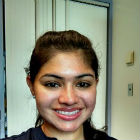
Hanyia N. Zaidi
Research Assistant
zaidih@email.chop.edu
Hanyia completed her Bachelor’s degree at the University of Connecticut and Master’s from the Southern CT State University. During college and following graduation, she worked in a Reproductive Sciences lab at Yale where her research focused on endometriosis and the role of stem cells in endometriosis. Hanyia recently joined the Rivella Lab in September 2016 and will work with the Gene Therapy group under Dr. Breda.

